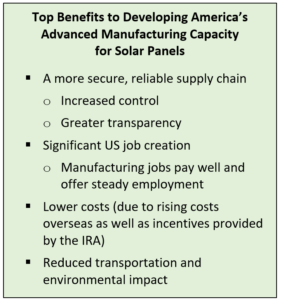Driving Investment and Job Creation with Domestic Advanced Manufacturing

The Inflation Reduction Act (IRA) has been called “game-changing” legislation that will affect America’s energy landscape for decades to come. The bill contains $370 billion in funding for energy security and climate change over the next 10 years and seeks to slash emissions to 40% below 2005 levels by 2030. Key among its many provisions are significant incentives designed to expand wind and solar energy.
While exciting, the bill’s potential won’t be realized if renewable energy developers can’t get their hands on the equipment necessary to build wind, solar, and energy storage installations. A case in point is the solar industry, which has been dramatically impacted by trade issues, tariff restrictions, and supply chain difficulties related to solar panels since early 2021, constraints that have created industry-wide disruption and caused the delay or cancellation of many gigawatts (GW) of US solar projects. Many factors contributed to this difficult situation, but one thing is clear: our lack of domestic manufacturing capacity proved highly problematic.
To address this challenge and lay the groundwork for a more sustainable clean energy future, in June, we announced that we joined forces with four other companies to form a solar buying consortium (the US Solar Buyers Consortium, or USBC) that will purchase more than 6 GW of crystalline silicon solar modules annually to encourage the rapid scaling of domestic solar manufacturing in the US.
By making long-term commitments to purchase domestically produced modules, the USBC is delivering a key driver necessary to stimulate investment in domestic manufacturing infrastructure. We anticipate that others in the industry will follow our lead and make similar commitments, supporting the development of a strong domestic solar supply chain that will create lasting resiliency and alleviate constraints faced by the industry today.
In addition, we estimate that the USBC’s $6 billion investment will help spur thousands of well-paying US manufacturing jobs. Some reports predict that the IRA could create nearly 10 million new clean energy jobs in the US, with approximately one million of those coming from advanced manufacturing. Within the solar industry, it’s estimated that the IRA has the potential to create over 250,000 new permanent solar jobs in the US by 2035 – for reference, there were 103,000 total jobs in the solar industry in 2010, and by 2035, the total number is expected to exceed 500,000.

For these reasons, we believe that the USBC represents an important step toward America’s clean energy independence. First and foremost, it will help ensure that Clearway can continue to provide affordable renewable energy to our customers. It will also give us greater control over our supply chain and allow us to have confidence that the materials and equipment we use are produced in an ethical, humanitarian manner that is consistent with our values and upholds our commitments to environmental, social, and governance (ESG) principles.
America’s domestic manufacturing will be supported by provisions in the IRA that incentivize the use of domestically sourced materials and equipment. At present, only about 3% of solar panels installed in the US were produced domestically. With the new incentives, it’s not inconceivable that the US could produce 30-40 GW of solar panels per year by 2030.
Of course, supply chains can’t be created overnight, and no magic wand exists to alter the geographic locations in which raw materials are found. As such, purchasing modules made in the US will necessarily require using materials and components from upstream sources outside the US. While unavoidable, this underscores the importance and value of our work to establish secure, legitimate long-term sourcing contracts.
While the consortium is focused on solar manufacturing, wind and energy storage are also critical in reinventing the US energy sector and decarbonizing our economy. We are working proactively to secure our supply chains for both technologies, efforts that include evaluating opportunities to enhance and expand domestic manufacturing capacity in these sectors.
The IRA heralds the beginning of a new era for the US energy and manufacturing sectors, but it is only the beginning. Fulfilling the potential envisioned by the IRA will require a tremendous amount of work, and at Clearway we are committed to doing our part to help lead the clean energy industry toward a more sustainable future.